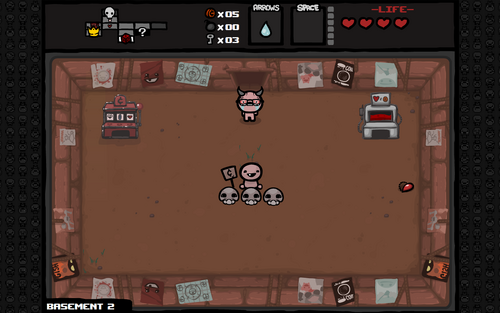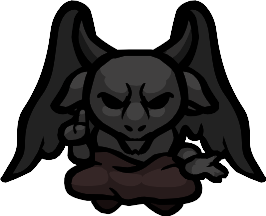Imagine the dungeon parts of the Legend of Zelda, top-down with Link fighting monsters, moving through the dungeon until the boss battle at the end. There's weak walls that can be blown up, there are secrets to find, enemies to fight, and upgrades to get. All that sounds fine so far, but the breakdown happens with who you are as a character, and who your prime adversary is.
You're a child, a naked, frightened child, who is running away from your mother. The end boss is your mother (for most of the game, we'll get into that in a bit), and she is trying to kill you. This is a bizarre setup for a bizarre game. Your only weapon is your tears, which you cry at the enemies who surround you. And your enemies? Equally bizarre, (un)fortunately. You will find deformed siblings, flies, spiders, giant flies, giant spiders, demons, monsters, and everything else you can possibly imagine.
The game is a roguelike game, through and through. What does this mean? It means infinite, or at least near-infinite replay value, as the dungeons that you move through are randomized. The layout changes every time you play. And when you die, you die. That's it. That particular run is over. There's no continue button, no extra lives (outside of very specific items), and no rerolling. If you get dealt bunk items, it's a real tough journey to try to get rid of them. But it's not just the layout that changes, because the upgrades also change every playthrough. The real pleasure of the game ends up as seeing how the various upgrades and items interact with each other.
And a lot of these items and upgrades have distinctly Christian, or Biblical themes attached to them. You can end up with the Bible, the book of Revelation, the book of belial, the dead sea scrolls, the nail, a prayer card, and a crown of thorns. It's absolutely laced through with Biblical items. How do you get items? Well, this is where the moral choice aspect comes into it.
Most games that have a moral choice system attached to them will present you with a pretty stark, obvious moral choice. If you harvest the little sister, then she dies, and you KNOW that's a bad thing to do. Atlas, Dr. Tennembaum, they'll all tell you that you probably ought not to be killing these girls. It won't stop you from playing the game, or from passing the game, but you know you're getting a bad ending when you finish the game. But the Binding of Isaac doesn't have multiple endings based on your moral choices. If you can get to the end of the game and beat the final boss, you win. That's it.
But there are choices to make. And these choices are in the form of beggars, really.
This is a beggar. He is obviously holding up a sign asking you for your pennies. If you give him up to four pennies, he will spit out an item. That's nice of him. Sometimes the items will be good, sometimes they'll be less helpful. Sometimes it'll be just what you were hoping for, frequently it'll be something you already have a lot of. But here's the juice, in addition to giving the beggar money until he spits out items, you may decide that you want some of that money back. And there is nothing NOTHING stopping you from dropping a bomb next to him, and taking a few steps back. The bomb will blow up the beggar, dropping coins, hearts, bombs, keys, whatever. And you can take it all back. And there are, on the surface, no penalties to doing this. And you can do this exact same trick in the many arcades scattered around the game as well.
As I say, on the surface, you suffer no penalties for doing this. The beggar will blow up, drop items, and you won't have to deal with new enemies, harder enemies, it doesn't make future beggars less likely to show up, it only changes one thing; There's a way to get really good items in the game, but that way will cost you. After completing a level, after getting to the end and beating a boss, there's a chance that a devil room will appear. And that's where the good items are. And you can choose them, they're out on display. There's only one problem with them, which is that it will cost you heart containers. That's right, the best items you can get will make it more likely that you'll die. Power comes at a cost. Why am I mentioning this? Because if you kill a beggar, or detonate an arcade, it makes it 35% more likely that a devil room will show up. And here's where the very subtle moral choice comes into it, because it's actually a choice.
Ordinarily, in video games, the moral choice is obvious. Here, it isn't. Most of us probably discovered that you could blow up the beggar by accident, and after having spent all our money on trying for good items, it feels sort of good to blow the beggar up, and recoup some of that money. And then yes, the devil rooms will appear, and again, what's the problem with that? The items are good, and if you take them, sure your health will go down a bit, but if you can afford it, why not?
Well, there's one more aspect to the moral choice system that we haven't discussed yet, one more surprise that will play on your mind whenever you're tempted to take a deal with the devil. If a devil room appears and you don't make any of the deals, there's a 50% chance that you will get another option the next time a devil room is slated to appear. There's a 50% chance that an Angel room will appear.
In these angel rooms, you get better items. That's not really a matter of opinion, the options are by definition better. Everything from giving soul hearts to giving eternal hearts, all the way to granting flight, increasing all stats, and all that. They're better. They're absolutely better. And unlike the Devil Room, they're free. There is no heart cost to gain these items. And the only way to get to the Angel room is to see a situation in which you're prompted to make a sacrifice, and then walk past it, to get the richer blessings to follow.
Other games have tried to do this, and have failed, because at their core they still want to give you a good guy or bad guy narrative. Isaac doesn't have that. When you play through it, the narrative that you get is shaped by your hundreds of little tiny decisions over the course of your gameplay. It's not a straight up good guy vs bad guy narrative, driven by scripted events, but it does have a story there. It's the story that you make yourself. Would you step over other people to get yourself ahead, or would you hold off, and partake in the potentially richer rewards to come?
A moral choice system that is a lot more like real life. No script, but plenty of consequences.



